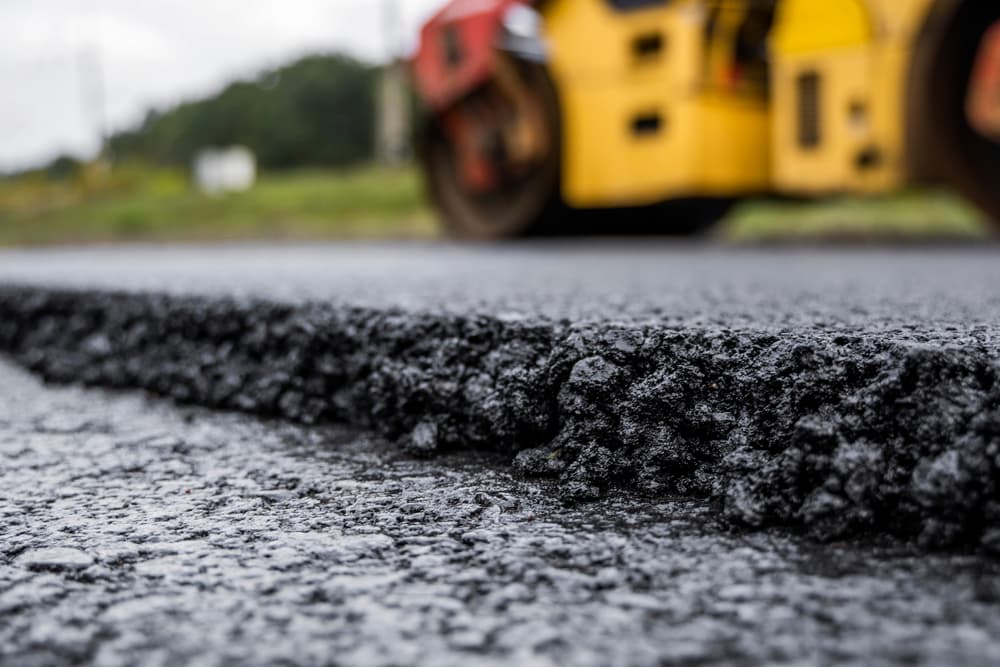Industrial Parking Lot Paving: Changing Areas with Hot Mix Asphalt
Industrial Parking Lot Paving: Changing Areas with Hot Mix Asphalt
Blog Article
Exploring the Environmental Advantages of Warm Mix Asphalt
The application of Warm Mix Asphalt in infrastructure tasks offers an engaging situation for lasting growth and environmental stewardship. By diving right into the elaborate information of its manufacturing processes and the cutting-edge use recycled materials, a deeper understanding arises of how this technology surpasses simple surface applications. The ecological benefits of Hot Mix Asphalt prolong far past first perceptions, providing a nuanced viewpoint on exactly how this material can pave the way for a greener future.

Lowered Greenhouse Gas Emissions
Warm Mix Asphalt manufacturing supplies a significant decrease in greenhouse gas exhausts compared to various other pavement materials. The manufacturing process of Hot Mix Asphalt involves heating up the blend of accumulation and asphalt binder to high temperature levels. This process calls for much less energy compared to the manufacturing of different sidewalk products, causing reduced greenhouse gas emissions. Furthermore, the usage of recycled products in Hot Mix Asphalt even more adds to minimizing its environmental impact. By incorporating recovered asphalt sidewalk and recycled asphalt shingles into the mix, the demand for virgin products is decreased, causing power savings and lowered discharges connected with removal and handling.
Research studies have actually revealed that Warm Mix Asphalt pavements have a smaller carbon impact over their life process contrasted to various other pavement choices. The sturdiness and recyclability of Hot Mix Asphalt better improve its ecological advantages by decreasing the need for regular maintenance or substitute, thereby preserving sources and minimizing exhausts connected with reconstruction activities.
Energy Performance and Preservation
The manufacturing procedure of Warm Mix Asphalt not just lowers greenhouse gas exhausts yet additionally contributes considerably to power effectiveness and conservation initiatives. Power efficiency is a key advantage of Warm Mix Asphalt manufacturing compared to other pavement kinds. The durability of Warm Mix Asphalt minimizes the frequency of maintenance and restoration, leading to long-lasting energy savings.
Sustainable Pavement Solutions

One trick facet of lasting sidewalk options is making use of recycled materials such as reclaimed asphalt pavement (RAP) and recycled asphalt tiles (RAS) By including these products right into the asphalt combinations, the demand for virgin sources is reduced, resulting in lower energy intake and greenhouse gas discharges during manufacturing. In addition, the reuse of these products helps draw away waste from land fills, adding to a more circular and sustainable economy.
Moreover, sustainable sidewalk remedies concentrate on maximizing sidewalk style to enhance efficiency and longevity. Techniques such as cozy mix asphalt (WMA) and rock mastic asphalt (SMA) enhance the longevity and strength of sidewalks, decreasing the demand for frequent fixings and replacements. By applying these ingenious techniques, infrastructure programmers can produce sidewalks that not just satisfy high-performance standards yet also reduce their ecological impact.
Minimized Environmental Influence
With an emphasis on sustainability and eco-conscious techniques, pavement solutions are made to lessen the environmental influence of construction and upkeep procedures. Hot mix asphalt, specifically, provides numerous benefits that add to minimizing the overall ecological footprint of roadway infrastructure. One vital facet is the recyclability of asphalt, which can be reused numerous times without compromising its quality. This characteristic aids in saving natural deposits and lowering the amount of waste sent to garbage dumps.
In addition, the production of warm mix asphalt discharges reduced levels of greenhouse gases compared to various other sidewalk materials, making it an extra eco-friendly choice. The power efficiency of asphalt plants has likewise improved for many years, leading resource to minimized gas usage and lower discharges. In addition, the smooth surface of warm mix asphalt lowers rolling resistance for vehicles, leading to lower gas intake and lowered air contamination from automobile exhausts.
Payment to Environment Adjustment Mitigation
Hot mix asphalt plays an important function in mitigating climate modification through its sustainable buildings and minimized environmental effect. One considerable contribution to climate modification reduction originates from the power efficiency of hot mix asphalt production. Compared to other pavement options, the manufacturing process for hot mix asphalt consumes less power and produces reduced degrees of greenhouse gases, thus reducing its total carbon impact.
Additionally, warm mix asphalt's capability to mirror sunlight, referred to as albedo, aids in lowering city heat island results. By reducing warm absorption and retention, warm mix asphalt pavements can lower the need for cooling in metropolitan areas, consequently reducing greenhouse gas emissions linked with power consumption for cooling functions.
Additionally, the toughness and recyclability of warm mix asphalt better improve its environment modification reduction capacities. Regrading. The long lifespan of asphalt review sidewalks decreases the demand for regular fixings or substitutes, ultimately lowering the carbon exhausts connected to roadway maintenance tasks. The recyclability of asphalt products minimizes the need for virgin sources and lowers the ecological influence of pavement construction, lining up with lasting techniques for climate modification reduction.
Conclusion
To conclude, the environmental benefits of Warm Mix Asphalt show its significant contribution to minimizing greenhouse gas discharges, preserving energy, and decreasing ecological impact. This sustainable sidewalk solution aligns with climate modification reduction initiatives, advertises source conservation, and boosts framework growth. By making use of recycled materials, energy-efficient production processes, and durable layout, Warm Mix Asphalt plays an important role in fostering a more eco-friendly method to framework building and construction.
The production procedure of Warm Mix Asphalt involves heating the combination of aggregate and asphalt binder to high temperature levels. Look At This By including reclaimed asphalt pavement and recycled asphalt roof shingles right into the mix, the requirement for virgin materials is minimized, leading to power financial savings and lowered discharges connected with extraction and processing.
One secret aspect of sustainable pavement solutions is the use of recycled materials such as redeemed asphalt sidewalk (RAP) and recycled asphalt roof shingles (RAS) Methods such as warm mix asphalt (WMA) and stone mastic asphalt (SMA) improve the toughness and strength of pavements, decreasing the need for frequent fixings and substitutes. Compared to various other sidewalk choices, the manufacturing procedure for hot mix asphalt takes in less energy and discharges lower levels of greenhouse gases, hence reducing its total carbon footprint.
Report this page